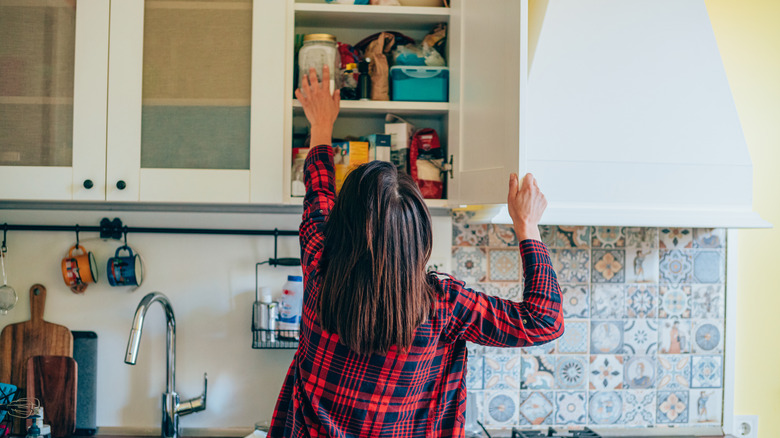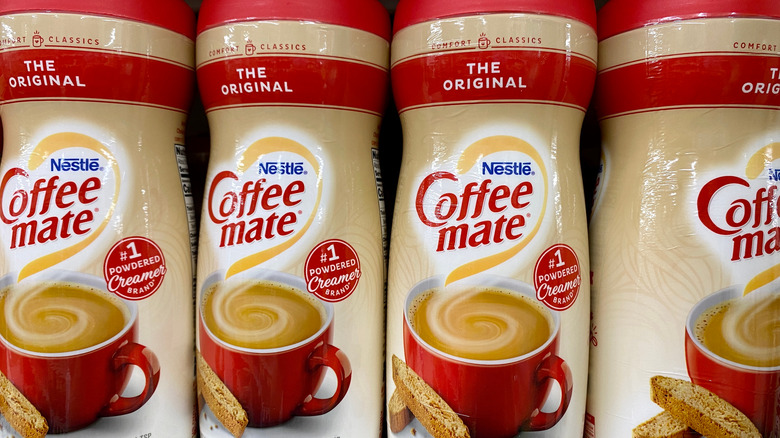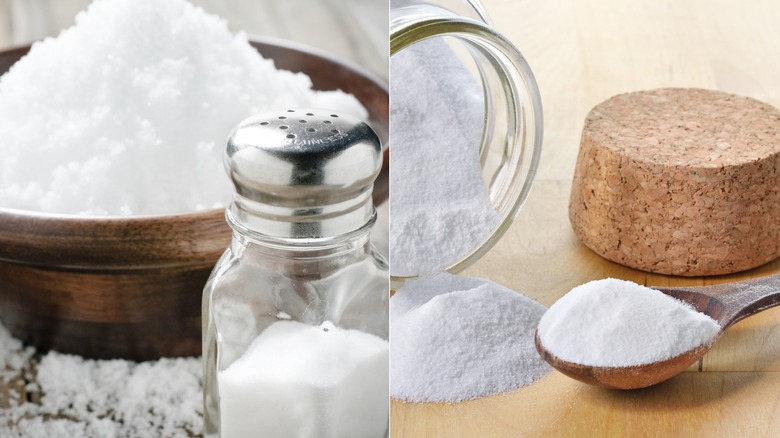DIY A Kitchen Cabinet Dehumidifier On A Budget With A Grocery Store Staple
We may receive a commission on purchases made from links.
Whether you live in a humid environment or have a kitchen with suboptimal ventilation, there are plenty of reasons to consider putting a dehumidifier in your pantry or kitchen cabinets. Keeping your cabinets free of excess moisture means that you can keep your food from spoiling prematurely. You can also keep the cabinets themselves in tip-top shape, especially if they are built from a moisture-sensitive material like wood. What's more, is that keeping a dry environment in your cabinets doesn't have to cost an arm and a leg. There are plenty of expensive dehumidifying machines on the market. In fact, you can make a dehumidifier using an inexpensive, and possibly unexpected, grocery store staple: powdered non-dairy coffee creamer.
The reason powdered creamer works so well as a dehumidifier is likely because of one of the primary ingredients — corn syrup solids. This ingredient is essentially dehydrated corn syrup, which naturally draws moisture based on its chemical composition. If you're a regular powdered creamer consumer, you will have probably noticed that old powder clumps up in the container. It is exactly this quality that makes the product great for a homemade dehumidifier.
How to dehumidify with non-dairy coffee creamer
Using coffee creamer to dehumidify your pantry is incredibly simple and cost effective. All you need to do is pour the powder into an empty, open container like a small bowl. Set it somewhere in your cabinet or pantry where it's least likely to be knocked over and cause a mess. Once you notice that the powder has become sticky, that's your queue to replace it with a new batch. A value sized, 2.2 lb container of Coffee-Mate Non-Dairy Creamer powder costs just $7 at Walmart. This should last for a while, depending on how humid your cabinets are.
There are some caveats to be aware of before trying this hack on your own. The first being that you should only use non-dairy creamer powder because you're leaving an open container in the cabinet. Uncovered dairy components will spoil quickly causing a bad odor and more issues than you started with. It's also important to note that this may not be the preferred DIY dehumidifier if you have a pest-prone kitchen or if you are worried about attracting pests in general. While corn syrup solids are effective dehumidifiers, they also contain glucose – which is universally attractive to insects. To mitigate the attraction of pests, you could put the creamer powder in a partially open container, like a lidded can with holes poked in the top. But you could also opt to use some different effective, budget-friendly grocery staples to naturally dehumidify your home.
Alternative DIY cabinet humidifiers
For an easy home-made pantry dehumidifier, look no further than one of the most common grocery staples of all — salt. Salt works as a dehumidifying agent because it draws moisture (it's the same reason it dissolves when mixed into water). You can use any kitchen salt you have on hand — sea salt, rock salt, kosher salt, and table salt all have the same primary makeup of sodium chloride. That said, good old table salt is probably the most cost effective option (26 ounces costs less than $1 at Target!). To make a dehumidifier with salt, place some in a small dish or container, and place that into another larger container. The larger vessel will collect water over time, which you can then dump right down the drain.
You can also use baking soda to dehumidify your cabinets. There are plenty of unexpected uses for the baking staple around the house, but its ability to absorb moisture is an impressive one. Baking soda is salt called sodium bicarbonate. As such, it has a similar effect on moisture to the culinary salt, and it even helps to neutralize odors. It also couldn't be simpler to "make" a baking soda dehumidifier. Just open a box of baking soda and set it in your cabinet. Once it has hardened or a crust has formed over the top, you'll know it's time to replace it with a fresh box (which should only cost you about $1 at most grocery stores or retailers).


